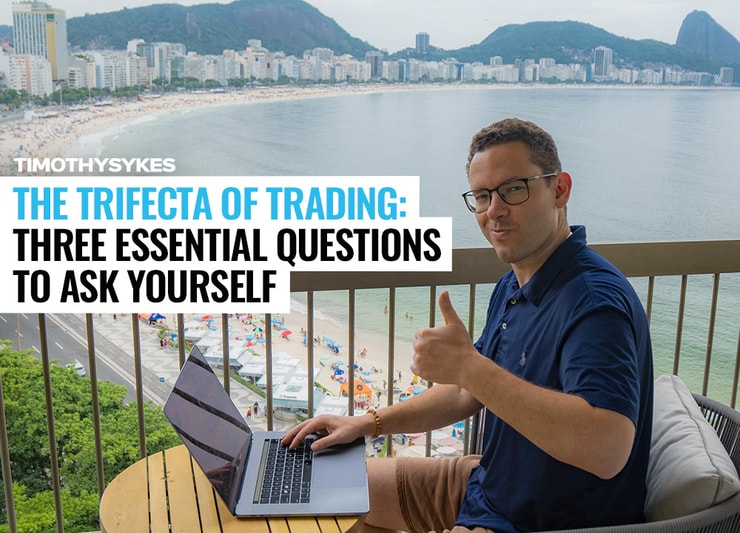The difference between making it as a trader and being another statistic often boils down to a few crucial questions you constantly need to ask yourself.
Get them right…
And the sky’s the limit.
Mess them up…and well…you can guess where that road leads.
Want to know what these game-changing questions are?
Table of Contents
Are You Maintaining Consistency?

I have never claimed to be the world’s best trader.
If you dissect my trading…you’ll find several flaws.
But that’s the thing…you don’t have to be perfect to make money in this game.
I’ve been consistently profitable year after year because I do a few things right.
By focusing on answering these three questions, I’ve outlasted most traders…
And no matter how experienced you become in #DayTrading & the #StockMarket you must ALWAYS remember basic rules & discipline or else the market will humble you in very uncomfortable & unforgiving ways. And we should cherish this because that balance helps keeps us all in check!
— Timothy Sykes (@timothysykes) April 6, 2023
I’ve been doing this for +20 years…but what’s even more exciting is that I’ve played a role in many of my student’s success.
Remember to trade small while learning, I now have 32 millionaire students, NONE of them made much/anything in year 1!
— Timothy Sykes (@timothysykes) January 31, 2023
Here are some more questions about consistency that you should address…
- Do you have a consistent trading routine, like creating a morning watchlist or a process to generate ideas?
- Are you journaling and reviewing your trades?
- Are you staying true to your trading rules?
- Are you maintaining emotional consistency and avoiding extreme reactions to wins or losses?
You must be consistent if you want to win in this game.
Who's still studying, reviewing your @StocksToTrade scans or making your watchlist for tomorrow?!? Never forget 90% of traders lose and it's 100% due to lack of preparation so don't you dare make that mistake. HOW BAD DO YOU WANT SUCCESS & HOW HARD WILL YOU PUSH YOURSELF?!?!
— Timothy Sykes (@timothysykes) July 12, 2023
Are You Staying Patient & Disciplined?

Fortunes are made and lost in the stock market each day.
It’s exciting.
The problem is a lot of newbie traders mistake that opportunity for an excuse to gamble.
The stock market isn’t a casino.
If you approach trading like gambling, your chances of making it are slim.
That’s why I preach to my students to stay patient and disciplined.
10:20pm study check, who's still up studying or making your watchlist for tomorrow? I want you to retweet/favorite this if you promise to study/work your ass off to become my next millionaire student, you CAN achieve it ALL with enough hustling/dedication & patience over time!
— Timothy Sykes (@timothysykes) March 17, 2023
Your first year should be spent STUDYING…STUDYING…STUDYING.
That’s where you need to exercise your patience and discipline.
If you’re farther along your journey, you’ll want to focus on trading your best setups.
By reviewing your trades, you’ll slowly identify your strengths and weaknesses.
Focus on what you are good at…and experiment and learn new strategies that you believe can make you more successful.
If you’re making money on your best trades and then gambling and losing on setups you don’t know or letting FOMO get the best of you…
Well…your results will probably suck.
Are You Focused On Risk?
One of the best things about being a TRUE coward trader is that it's very tough to lose big. If you trade extra-meticulously w/extra-small size & extra-patience/discipline, you just will NOT blow up very easily. Like a coward who runs away from every fight does NOT get beat up
— Timothy Sykes (@timothysykes) July 3, 2023
I’m not afraid to say that I trade like a coward.
Why?
Because I trade volatile stocks…many of them are companies with no fundamentals whatsoever.
What can I say…it’s a scary business.
I’ve taken some BIG losses in my career…and the feeling is miserable.
It’s also pretty stupid to bust your butt studying, working hard, building your account up…only to have one or two bad trades wipe out all that progress.
I go into my trades knowing that I can be wrong…
Knowing that if I’m not focused that I can easily get crushed.
That’s why I tell my students to cut losses quickly.
Who cares if you make a lot of money from single trades…if you’re also taking big losses, then you’re not going anywhere.
Also, if you can manage risk properly, that gives you more room to learn and develop the skills you need to become a successful trader.
It’s unlikely you’ll make money your first year…that’s why protecting capital is so important. And it remains vital throughout your career.
Last Word

You’ll never hear from me that trading is easy.
But I believe there is a way to reach your goals faster if you follow a proven process.
If you’d like to know what that is…
Then I Invite you to attend one of my free live training classes.



Leave a reply